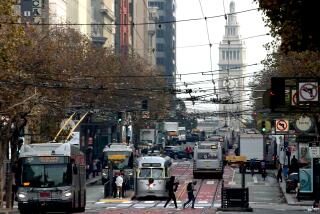African Dot-Com Pioneers Forge a Future
- Share via
ACCRA, Ghana — U.S. Treasury Secretary Paul O’Neill and U2’s Bono are seeing plenty of suffering on their 12-day fact-finding trip on African aid. Camera crews zoom in on barefoot children begging by an open sewer; pundits note that the AIDS rate is soaring while per capita income stays about the same.
To many Americans, it’s just Africa, the place where time has stopped and people die young.
The dismal statistics are all true. But a slightly closer look, at least in Ghana, will show something else: an extraordinary technology boom. It’s not quite San Francisco in 1998, but there’s something similar going on.
In fact, for every child like Zakaria Turay, a 14-year-old war veteran in Sierra Leone recently profiled in Newsweek, there’s a young man like Robin Kwakofi, a 24-year- old Ghanaian Web programmer with his own aspiring dot-com.
When Turay was abducted by guerrillas five years ago, Kwakofi was taking the bus to Accra’s one Internet cafe and teaching himself to program. When Turay was running drugs and drinking blood, Kwakofi was redesigning the Web site for Ghana’s Joy FM radio station. As Turay tries to reassemble a life, Kwakofi plans for what he calls an African technological revolution.
Young men and women like Kwakofi fill Accra. And although the whiz kids of Ghana don’t have nearly the technological or educational infrastructure of their San Francisco role models, they do have the same ambitions.
Kofi Dadzie, a 25-year-old programmer, runs a software company called Rancard in Accra. He has seven employees now, but he talks about having 10,000 in just a few years. Up the street, Ghanaians pack the downstairs of the Busy Internet cafe day and night, using the cafe’s 100 flat-screen monitors and fast satellite connection. Upstairs, 10 companies use the connection for everything from e-commerce to typing up handwritten street violations for the New York City Police Department. Directly across the street, students at the NIIT computer school gather and talk of their dreams of starting software companies.
The story that Americans hear from Ghana during Bono and O’Neill’s travels matters more than one might think. Africa has lagged in development for many reasons, ranging from poor geographic luck (lots of malaria; not many good shipping routes) to horrendous political leadership. But the continent also suffers because of the perception of Africa as a monolithic sinkhole, and thus a place unworthy of investment or attention.
To many Americans, Africa is just Africa--even if Ghana no more resembles Sierra Leone than the United States resembles Mexico. Ghana has a truly democratically elected government, has been stable for 20 years with virtually no ethnic conflict and there probably isn’t a single child with a Kalashnikov hiding in the bush.
Moreover, as Asian nations showed in the 1990s, nothing spurs development in one country more than development in a neighboring one. People learn new skills, access new markets and are competitive. Africa hasn’t had a real success story yet. But if just a few of the Internet pioneers’ dreams come true, Ghana could be it.
Asked what he hopes for, one of Turay’s fellow fighters told Newsweek that he wanted pens and books. That’s the classic desperate message from Africa. It’s real, and it’s not that far from what Bono wants. But Kwakofi may have a more important African message. Asked what he would say to O’Neill, Kwakofi says, “I would tell him to say to American technology companies that they can invest in Ghana.... Conditions are right for a boom.”
*
Nicholas Thompson is a fellow at the New America Foundation in Washington.
More to Read
Sign up for Essential California
The most important California stories and recommendations in your inbox every morning.
You may occasionally receive promotional content from the Los Angeles Times.













